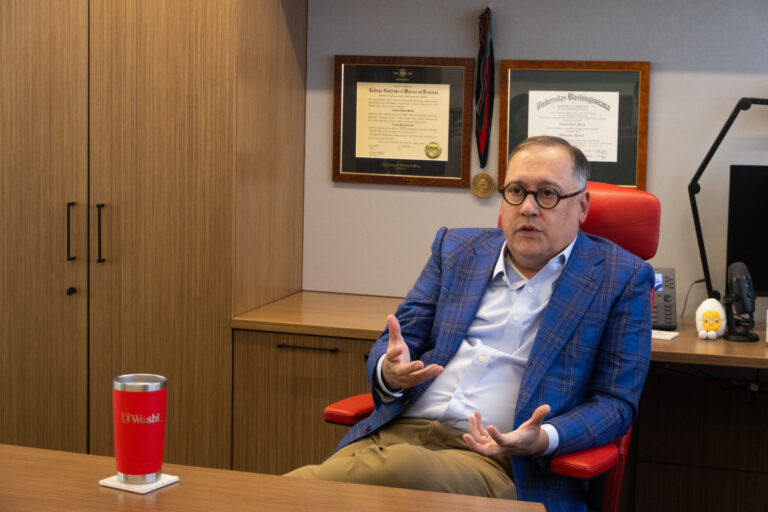Chancellor Martin talks with Student Life in a Q&A on Sept. 11. (Bri Nitsberg | Managing Photo Editor)
In a Q&A with Student Life this Tuesday, WashU Chancellor Andrew Martin revealed that the University is planning to build a new dormitory on campus. Martin also reaffirmed the school’s commitment to financial responsibility and diversity of perspectives and backgrounds during a time of political uncertainty for universities.
Martin shared that WashU intends to build a new dormitory building as the University works toward a long-term goal of having all first-year and sophomore students live on the South 40. Last year, the University worked with Clayton city government to change the zoning on the South 40. The new regulations grant the University more flexibility to build out housing in the area. Though Martin declined to provide further details on the new building, he said more information will be shared with the community in the coming academic year.
Additionally, Martin added that there are no finalized plans for Fontbonne’s campus, which the University acquired in 2024. However, the University is considering using the land to house students.
“The demand for students to live on the campus is up, up, up, and so too is the demand to live on some of our off-campus properties as well,” Martin said. “So Fontbonne provides us some really interesting opportunities there, but we’ve got a lot of planning to do, and we’ve got to get to a point that we understand what the financial model looks like going forward.”
Alongside the new dormitory building, Martin mentioned the new career center being built on the corner of Skinker Boulevard and Forsyth Boulevard, which is slated to open in 2027. He also shared that the University is interested in building a Center for Healthy Excellence, which would act as a centralized resource for student wellness. Martin described both of these endeavors as “investments around the student experience.”
Martin reaffirmed that other capital projects, such as the construction of Riney Hall and the renovation of Mudd Field, will be halted for the foreseeable future due to financial uncertainty.
“I have no idea on timeline,” Martin said. “Until we know what the new model for federal research funding looks like, … we’re not going to be doing a lot of investing in a new academic building.”
Student Life also followed up with Martin regarding previous statements about the University’s finances he made during a meeting with Student Union (SU) on Sept. 2. At that meeting, Martin shared that three of WashU’s eight schools are running a deficit. When asked by Student Life to identify the three schools, the chancellor declined. He added that the University is working closely with the deans of each school to balance their budgets.
“Each school has handled this in slightly different ways, and some schools had to cut a little deeper than others,” Martin said. “But what we’ve instructed each of our deans to do is to get to a scenario where revenues outpace expenses within the next three years.”
Martin also discussed WashU’s commitment to its diversity initiatives in the face of pressure from the Trump administration. He said that the recently created Inclusive Excellence Advisory Committee is reviewing programs to ensure that programs are in compliance with the law, but that the University remains committed to its values and its students.
“Our institutional commitments remain the same. We believe that a diverse student body and a diverse faculty and a diverse staff is a good thing, that diversity of perspective, diversity of background, makes us the richest intellectual community it possibly could be.”
He pointed out that WashU has not renamed the Center for Diversity and Inclusion.
“Unlike some universities, which would have renamed their ‘Center for Diversity [and] Inclusion’ the ‘Belonging Center’ or something, we still have the Center for Diversity and Inclusion, which is an important part of our community building and an important part of student success.
Despite the various challenges WashU is facing, such as the endowment tax increase and cuts to federal funding, Martin said he maintains an optimistic mindset for this upcoming year.
“This year is an opportunity, in a way that’s not going to be terribly visible to students, to really change the way in which we run the business of the University,” Martin said. “The better that we can do with that is going to free up more resources for our core academic mission and for student support.”


